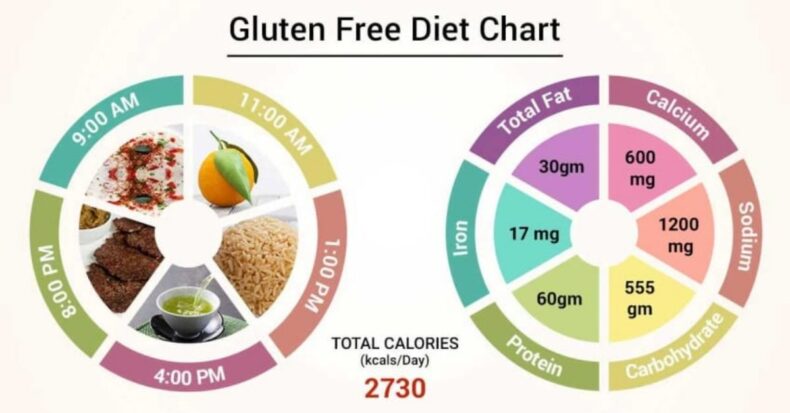Gluten-Free Food is Becoming Trendy, Let’s Understand Why? and Is It Good for Your Health?
Gluten
Gluten is a protein found in wheat, rye, barley, and triticale.
Hidden gluten in your food:
Wheat – Bread, Soup, Baked goods, Pasta, Sauces, Cereals, Roux, and Salad dressing.
Barley- Malt (and all Malt products), Brewer’s yeast, Beer, Soups, and Food colouring.
Rye– Cereals, Rye beer, and Rye bread.
Triticale- Cereals, Pasta, and Bread.
Oats- Oats naturally are oat free, but they could be contaminated during farming or cooking. So, checking labels for gluten-free oats is always recommended.
Reading Labels is always useful and helpful for checking foods that seem gluten-free.
Why is Gluten-Free Food Becoming a Trendy Diet?
Gluten-Free food is necessary for people with Celiac Disease. Gluten damages the small intestine of people with Celiac Disease, and thus nutrients can’t be absorbed in their bodies.

Celiac disease system is diarrhea, abdominal pain, joint pain, low blood count, heartburn, vomiting, malnutrition, constipation, headache, fatigue, nausea, bloating, and other symptoms.
Delayed puberty, slow growth, cramping, itching, lactose intolerant, weight loss and skin rashes are the other symptoms of Celiac Disease.
People with wheat allergies, gluten sensitivity, or irritable bowel syndrome also have similar symptoms, so taking proper consultation from a doctor before following a Gluten-Free diet is advised.
Gluten-Free Diet

Gluten-Free Whole grains- Oats (gluten-free), arrowroot, teff, amaranth, millet, tapioca, sorghum, buckwheat, wild rice, brown rice, and quinoa.
Fruits and Vegetables– Canned and Frozen fruits and vegetables may contain added gluten. Dried fruits, pre-chopped fruits and vegetables can also get contaminated by gluten. So, Fresh fruits and vegetables are preferable and are a healthier alternative for your health.
Protein– Processed meats, meats substitutes, cold cut meats, ground meats, ready-to-eat proteins and sausages need to be double-checked for gluten before eating. Seitan protein must be avoided.
Dairy Products– Flavored milk products such as yoghurt or ice cream may contain gluten, so they must be checked. Malted milk products must be avoided.
Fats and Oils- Flavored oils and cooking spray should be double-checked for gluten.
Beverages- Pre-made smoothies, added flavors, mix-ins, distilled liquors, vodka, gin, and whiskey should be double-checked. Beers, lagers made from gluten-containing grains, ales, non-distilled liquors, wine coolers, and malt beverages must be avoided.
Spices, Condiments, and Sauces- Malt vinegar, teriyaki sauce and wheat-based soy sauce must be avoided.
Rice vinegar, gravy mixes, stuffing mixes, marinades, stock cubes, bouillon cubes, salsa, dry spices, pasta sauce, salad dressing, mayonnaise, barbecue sauce, relish, pickles, tomato sauce, Worcestershire sauce, ketchup and mustards must be double-checked for gluten.
Is a Gluten-Free Diet Good For Your Health?
People opting for gluten-free food with no medical condition or prescriptions from doctors can face adverse effects for not taking a balanced diet and proper nutrients.
A gluten-Free diet eases the physical symptoms and stress for people with Celiac Disease, wheat allergy, or other gluten-related problems.
However, people opting for a gluten-free diet just for a trendy lifestyle can cause an increase in weight as gluten-free diets to contain high calories and sugar.
A gluten-Free lifestyle is also costlier than the gluten food lifestyle in general. Lack of essential vitamins, nutrients, and fibre are other consequences for opting for a gluten-free diet as an optional lifestyle. High sugar content also increases the risk of type 2 diabetes risk in people.
So, you should select a Gluten-Free diet only when necessary and prescribed by the doctor.













